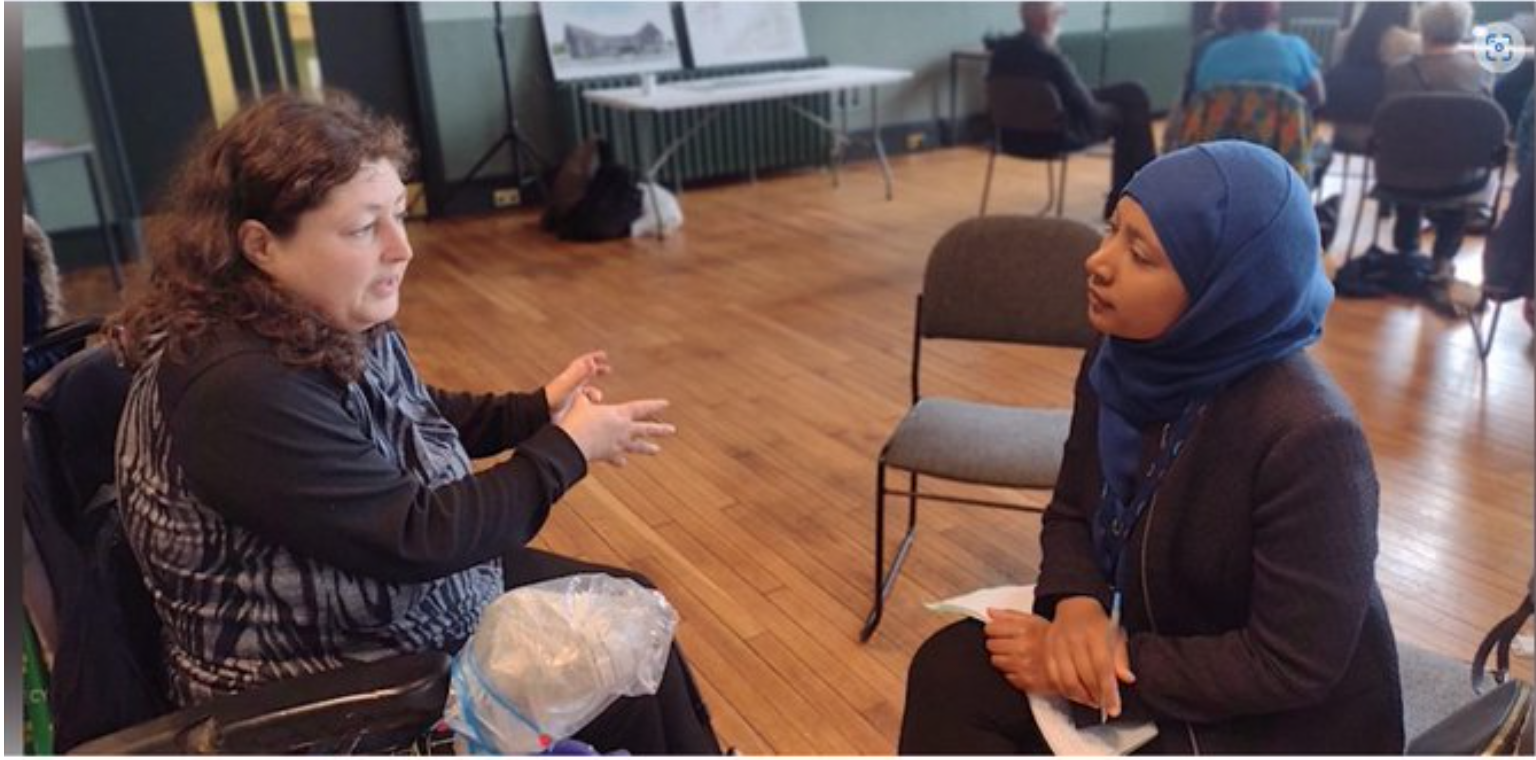By the Manchester Local Plan Coalition
Please read the letter below and this article in the Manchester Meteor. If you are as concerned as we are, please use this model letter to email your MP.
This letter was sent to Andy Burnham and the leaders of the ten Greater Manchester Local Authorities on 7th January, 2021:
As a coalition of community groups and membership organisations concerned about democracy, the environment and the public realm, we have been alarmed by recent Government announcements on the English Planning System.
We believe the proposed measures amount to an emergency for communities and local authorities across England.
The controversial ‘Planning for the Future’ White Paper is receiving ongoing scrutiny and challenge, with much detail still to be worked out and its proposed reforms at least three years off.
It is the introduction via Statutory Instruments of separate fast-track changes which has prompted us to write to you urgently to request that you intervene on behalf of Greater Manchester’s local authorities and constituencies.
The Government is committed to building 300,000 new homes a year to tackle the housing crisis. However, telling developers to “get on with it - do what you like”, which is what the new measures amount to, will create far more problems than it solves.
The changes announced by Robert Jenrick on 3rd December, which we outline below, cannot be allowed to enter statute when so many questions remain:
- How can councils deliver viable urban centres if left with such modest control over development management?
- How can the Government justify not imposing affordable housing /Section 106 obligations on PDR schemes?
- Aside from increasing use of Article 4 directions, how could authorities prevent the conversion of buildings in plainly unsustainable locations?
- How could zones for growth or renewal (proposed in the White Paper) actually function if you can move seamlessly between the many Class E uses, then into residential?
- What about the impact of losing retail and other amenities vital for local communities, such as nurseries?
- How can we ensure that new homes are well-designed, energy efficient and meet other quality, design and access standards, if this is not covered by prior approval consents?
- How does all of this fit with the Secretary of State’s recent edicts about the need for the right homes in the right locations, a fast-track for beauty and a focus on design and local vernacular?
- What about the statutory development plan? Statutory duties like section 38(6) or the Listed Buildings Act? Other material considerations?
- How would the prior approval process cope with the infinite permutations of buildings? It is simply not possible to write into legislation the necessary variety of detail and conditionality that is currently weighed up by planning committees.
- How would appeals be determined?
Context and summary of the proposed changes
In August 2020, the Ministry of Housing, Communities and Local Government (MHCLG) massively increased ‘permitted development rights’ (PDR), allowing:
- shops, cafes, gyms and other high street buildings to be converted between uses without applying to do so.
- buildings such as blocks of flats, offices and homes to extend upwards by two stories to create new homes.
- demolition of existing buildings to be replaced with new residential buildings, again without going through the planning process.
The new rules were laid before Parliament on the last day of the parliamentary term, due to come into effect the day before Parliament returned.
Campaign group Rights: Community: Action sought a Judicial Review, claiming:
“a significant breach of the EU Strategic Environmental Assessment Directive, a failure to comply with Public Sector Equality Duty and a disregard for matters raised by previous consultation and for matters that might have been raised by proper Parliamentary debate”.
On 17th November they heard they had lost the case (an appeal is pending).
On 3rd December, Robert Jenrick announced a further set of PDR which, if implemented, will ensure that town planning as we have known it will no longer apply to the vast majority of development that can take place in urban areas.
The proposed PDR apply to ALL buildings in Class E, a new ‘commercial, business and service’ use class covering shops, restaurants, offices, gyms, banks, GP practices, nurseries, light industry and other business and leisure premises.
It will allow movement between these uses, or conversion into housing, without planning permission.
As you will be aware, the conversion of offices to residential units has been in effect since 2013. While it has significantly boosted net additional dwellings in England, which is much needed, the Government’s own quality standard review, published in July, showed many problems with PDR housing. These included shoddy conversions, siting of homes away from transport links and services, and the loss of tens of thousands of affordable homes due to Section 106 exemptions.
A RICS report has estimated that, while being highly profitable for landowners and developers, between 2013 and 2017 local planning authorities across England missed out on financial contributions of up to £48m as a result of this policy.
A positive response to the report is that new homes delivered through PDR will henceforth need to meet minimum national space standards and provide “adequate natural light” (not the same as a right to a window).
It was not anticipated that it would be followed by a right to convert practically any building of any size to residential without planning permission.
The homes will instead be consented through a ‘prior approval’ process whereby councils would be unable to refuse a development that did not relate to this short list of considerations: flooding, site transport, contamination, adequate natural light, fire safety, noise from existing commercial activity, and other impacts on the intended occupiers of living in an area considered important for heavy industry or waste management.
Existing rules on climate change would not apply. Design standards would not apply, not even in conservation areas. There would be no restrictions on size; no requirement for affordable homes.
In a recent survey, 78% of local councillors in England said the zoning system proposed in the Planning White Paper is undemocratic. But at least councillors would get a say on the zones. Via the Class E PDR regime, local authorities will lose all meaningful control over place-making.
An application fee of £96 per dwelling is proposed, up to a maximum of £4,800 for 50 homes. This low fee, along with the limited prior approval matters and no reference to s106 or Community Infrastructure Levy contributions, appears to incentivise very large office and retail sites to make lots of exploratory applications without a firm intention to deliver. This could make it hard for councils to understand what is in the housing delivery pipeline.
No planning application process means no funds for public services. While MHCLG suggests local authorities “would benefit from reduced volume of planning applications, offset by a reduction in fees”, this assumes that all of the sites would have come forward anyway, rather than being encouraged by this new regime.
The new rules could increase, rather than decrease, land banking.
According to planning solicitor Nicola Gooch, the impact of Covid-19 on the economy will create:
“a real temptation for commercial landlords to flip vacant units to residential before looking at other, more traditional, commercial uses for them. Unless Councils are very quick off the mark with their Article 4 Directions, the future of many high streets may very quickly become predominantly residential”.
The government has justified these proposals at least partly on the basis that high streets and town centres need flexibility to enable them to regenerate and thrive. But how is that achieved by denying local people any say on the shape and feel of their communities and civic centres, and removing councils’ ability to secure balanced and imaginative new uses for civic space?
Alongside the new PDR rules, MHCLG is proposing to shorten public consultation to 14 days for any prison, hospital, university campus or other public infrastructure that wants to expand. Yet local communities should have a role in shaping these anchor institutions.
The consultation
We are a diverse collection of local groups and organisations, collectively focussed on housing and homelessness, the crisis of affordability, the environment and climate change, neighbourhood action and local democracy. We want our GM authorities to have the tools, powers and flexibilities necessary to plan for and deliver the quality housing - especially affordable housing - that our communities are crying out for.
We want Greater Manchester to meet its climate targets; for our towns and boroughs to be in control of their own, complementary, economic strategies. And we don’t want to see our services and local infrastructure depleted further by an effective resource transfer to private developers.
The fact that Rights: Community: Action lost their court case is an alarm call. It was determined that the Secretary of State had no obligation to gain consent for the sweeping changes announced in August.
The Government is consulting on the latest measures, via an online survey that is open until 28th January, after which they will publish a response. Whatever the feedback, there is no guarantee that it will affect their plans.
We therefore request that Greater Manchester’s leaders and public bodies use your combined weight and media access to make known your views not just through the online consultation but loudly and publicly, to galvanise other regions to do the same.
The consultation seeks to understand the potential impacts of these measures on business, local planning authorities and communities. It invites comment on the proposed prior approval matters and whether there should be additional matters. With a nod to the Public Sector Equality Duty, it also invites views on any impacts arising from these measures on those with a protected characteristic.
We hope you agree with us that the very premise of this consultation is wrong, given the risk to housing standards, local democracy, place-making and climate strategy. The towns and cities of Greater Manchester need the right housing, in the right places - affordable and served by the necessary community infrastructure and employment opportunities.
This is not the way to Build Back Better, and we entreat you to help prevent this fast track, by-the-back-door attempt to fulfil the Prime Minister’s ambition to “tear down” the English planning system.
Manchester Local Plan Coalition (including GMHA, The Meteor, Friends of the Earth, Steady State Manchester and Climate Emergency Manchester)
and over 50 other signatories.





